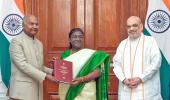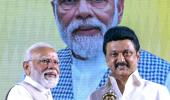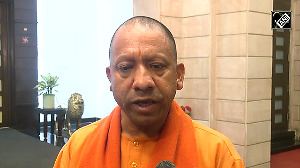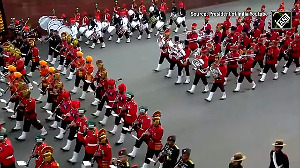'What happened to Andhra Pradesh? It is the perfect example of the transientness of Federal Units.'
'Federalism is a transient thing in this country.'

Come 2026, a major change is expected to take place regarding the size of India's constituencies.
The delimitation exercise was to happen in 2001, but the then Atal Bihari Vajpayee government froze it for 25 years.
Delimitation is fixing the boundaries of the constituencies based on the number of people it represents as the Constitution stipulates proportional representation as the basis for the allocation of seats in the Lok Sabha.
The worry many states, especially the south Indian states which have implemented family planning effectively, is that they are going to lose seats.
For example, it is said that Tamil Nadu may lose 7 seats and Kerala, 5 seats while UP may gain 8 seats, Bihar 6 seats and Rajasthan 5 seats.
It was reported that for every rupee given to the Centre, when Bihar gets Rs 7.06 and UP gets Rs 2.73, Karnataka gets 15 paise, Tamil Nadu gets 29 paise and Kerala, 25 paise...
But more than the loss of seats, what the states should be worried about is how revenue is shared among states, retired Supreme Court Justice Jasti Chelameswar tells Rediff.com's Shobha Warrier.
As we are getting closer to 2026, the debate over delimitation of Lok Sabha constituencies also is heating up.
Is it because the Constitution talks about proportional representation as the basis for the allocation of seats in the Lok Sabha that delimitation exercise is necessary?
Of course. It is because in a Republic, each citizen is entitled to participate in the law-making process.
The system of proportional representation is enshrined in the Constitution of India so that the weightage with regard to each other is approximately the same, irrespective of the State to which a person belongs to.
If there is a representative for 10 lakhs of people from Andhra, Kerala also should have a representative for 10 lakh people. So also UP, MP, Maharashtra.
That's the purpose behind the idea of proportional representation.
The 42nd Amendment froze the number and boundary of constituencies for 25 years because Parliament didn't want to punish the states that implemented family planning policies effectively.
These are the opinions of some politicians and some private individuals.
Parliament never said it was freezing the number because of the reason you cited.
Originally the Constitution said tghe delimitation exercise is to be undertaken after each census.
There is nothing in the Constitution which determines as to when the census is to take place.
The Census Act gives the discretion to the Government of India in this regard.

Earlier, states were asked to take measures to control the rising population. Some states like the southern states succeeded while northern states like UP, Bihar, etc were not able to even today.
As the Constitution talks about proportional representation, won't the states which successfully implemented population control measures are going to lose the number of seats in Parliament.
Is it fair?
"States were asked...." Who asked?
There is nothing in the Constitution which mandates controlling the population.
There is no law that prohibits or promotes the number of children a family can have.
That a state has implemented family planning successfully is not a relevant consideration in the scheme of the Constitution for the purpose of delimitation.
Whether it is fair or not is a matter of opinion.
The Constitution says the composition of the House will be based on population.
But the states that have controlled population growth are at a disadvantage after the delimitation exercise...
What is the disadvantage?
They will lose seats because they have less people...
How is it going to affect a state if it sends less number of MPs? What is the disadvantage they are going to suffer?
Just having certain number of seats in the Lok Sabha is not going to give any advantage or disadvantage to a state in constitutional governance.

What is the solution to the problem that will be created by the delimitation exercise?
Please identify the problem first.
Have you heard any politician talking about it? No political party will be willing to discuss the issue because they do not want to antagonise the voters of the more populous states.
Have you heard any statement from any political party in this regard?
In my opinion, the debate is purely esoteric and confined to newspapers.
On the other hand, what is relevant is how the funds are distributed by the Government of India among various states.
Whether a state has 20 MPs or 200 MPs is not the issue. The issue is whether each state is getting a fair share of the total revenue collected by the government of India from each of those states?
The population of a state is only one of the factors for determining the share of a state in the process of devolution of funds from the Government of India.
There are specific provisions of the Constitution of India which deal with that aspect (Articles 268 to 273).
The real question would be whether the Union of India is allocating funds from out of the revenue collected by it from the people residing in various states in a rational and reasonably proportionate measure.
We can understand some states are economically under-developed and they need to be assisted.
An examination and identification of the factors which contribute to the situation that a state needs assistance is essential.
Thereafter, those factors are to be attended to in order to improve the economic strength of a state.
The central assistance cannot be for eternity. Assurance of assistance forever would promote inefficient administration of those states forever.
For how long will such assistance continue? How long a state that contributes more but gets back less, remain happy with the situation?
So, the problem is not the number of seats. The problem is how funds are distributed.
There has to be a rational basis on which funds are distributed by the Government of India.
 IMAGE: Justice Jasti Chelameswar
IMAGE: Justice Jasti ChelameswarIt seems when the southern states contribute 31% of GDP, they get back only 18% of the funds allotted to states...
Distribution of funds requires a more concrete debate as that is the real problem the states face, and not the number of seats.
You mean allocation of funds to the states is the most pressing problem than what will happen after the delimitation exercise?
If there is disproportionate margin between what a state contributes under various Head of Taxes and Duties falling under the First List of the 7th Schedule and what the state gets back, the reasons are required to be examined.
Whether such reasons are rational or not will be the real issue.
For that we need complete data.
Elections are round the corner and the BJP is clamouring for 'One Nation, One Election', but other political parties are against it.
Do you think this idea is viable? Will this affect the federal structure of the country?
This is a very important and serious issue that needs a great deal of examination and debate.
In my view, India is not strictly a federal democracy.
Before the Constitution was framed, India was not a single entity politically. India exists today as a single political entity-Nation.
Federation pre-supposes the existence of several federal units whose identity and existence cannot be tinkered.
Under our Constitution, a state can be created and divided by a simple law in the parliament.
What happened to Andhra Pradesh? It is the perfect example of the transientness of the Federal Units.
Federalism is a transient thing in this country.
Will the One Nation, One election theory work?
I have grave doubt whether it can work in the existing Constitutional framework. It requires great deal of examination and debate.
Feature Presentation: Aslam Hunani/Rediff.com











 © 2025
© 2025